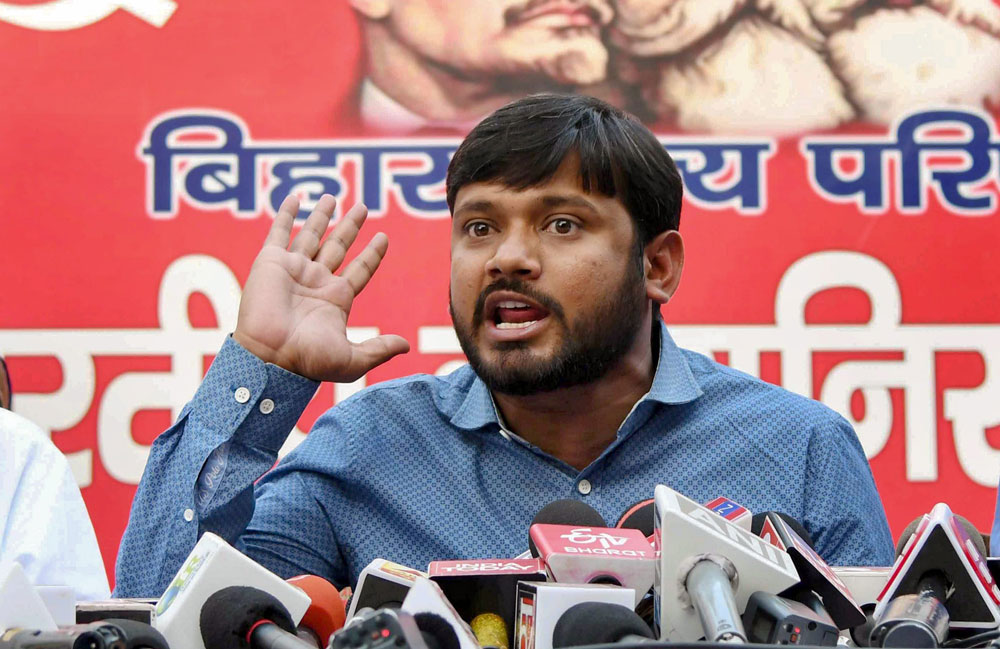Former JNU student leader Kanhaiya Kumar had to abort a scheduled address to students of a university in Karnataka after the institute’s authorities withdrew permission citing “oral orders” following threats by Sangh parivar groups to disrupt the event.
Gulbarga University’s decision has kicked up a row, with writers and thinkers accusing “fascist forces” of denying people even their fundamental rights.
Kanhaiya was scheduled to address the students on Tuesday on “Responsibility of Youth in Protecting the Indian Constitution” at an event organised by the Dr BR Ambedkar Chair of the university, some 580km from Bangalore.
But the university’s vice-chancellor, Parimala Ambekar, abruptly withdrew permission shortly before Monday midnight after Hindu right-wing organisations such as the Sree Rama Sene threatened to disrupt the talk.
City police immediately declared prohibitory orders inside the university campus.
The organisers then tried to shift the venue to Visvesvaraya Bhavan in Gulbarga city, but the police denied permission saying it would be difficult to deploy security at such short notice.
Kanhaiya, however, participated in another event organised by Left and Dalit writers and thinkers at the BR Ambedkar Degree College away from the university campus on Tuesday evening.
Ambekar, who faced criticism from students and progressive groups, told an impromptu news conference on Tuesday that she had to cancel the event following “oral orders” from above and had exercised her discretionary powers.
“I took the decision after considering law and order issues on the campus and oral orders from the department (of education),” she told reporters.
The Telegraph tried several times to contact the vice-chancellor but she could not be reached for comment. Her office claimed she was busy at a conference.
Kanhaiya blamed the BJP government for cancelling his programme. “Don’t people from other political parties and streams of thought address students in the university?” he said while interacting with reporters in Gulbarga on Tuesday. “This is gross misuse of power to suppress dissent. Why is (Prime Minister Narendra) Modi bent on creating problems?”
Karnataka deputy chief minister C.N. Ashwath Narayan, who holds the higher education portfolio, defended the university’s move. “Universities are places of learning, not to discuss politics,” the BJP leader told reporters on Tuesday.
Earlier, in August, Kanhaiya had spoken at an event in Mangalore, a Sangh bastion, where he had urged youths to start questioning Modi.
On Wednesday, progressive groups held a sit-in protest outside the deputy commissioner’s office in Gulbarga over the university’s decision to withdraw permission for Tuesday’s event.
Kannada writer R.K. Hudgi, one of the organisers responsible for bringing Kanhaiya to Gulbarga, said the BJP-led government in the state was behind the cancellation of the event.
“The ‘oral orders’ that the vice-chancellor mentioned came from the government,” Hudgi told The Telegraph on Wednesday. He blamed RSS cadres and Sree Rama Sene activists for making an issue of Kanhaiya’s presence after the university had given the go-ahead for the event.
“I got a call at 11.38pm on Monday from one of the organisers about the cancellation of the university event. So there was very little time to organise an alternative event. Although we tried to organise one at Visvesvaraya Bhavan, the police said it was too short a notice to deploy security.”
K. Neela, a Kannada writer and state vice-president of the CPM-backed Janwadi Mahila Sanghatan, said the cancellation of the event was indicative of the rot that has set in because of Hindutva politics.
“The BJP government has gone against the university by forcing the university to cancel an event originally cleared by its syndicate. This clearly shows the rot in the system controlled by the BJP and the RSS,” Neela said.
“Such violation of rights does not augur well for the educational system in BJP-ruled states, which is unfortunately becoming the playground of the Sangh parivar.”
Hudgi and Neela were among Kannada writers who had returned their Sahitya Akademi awards in 2015 alleging intolerance in the country.











